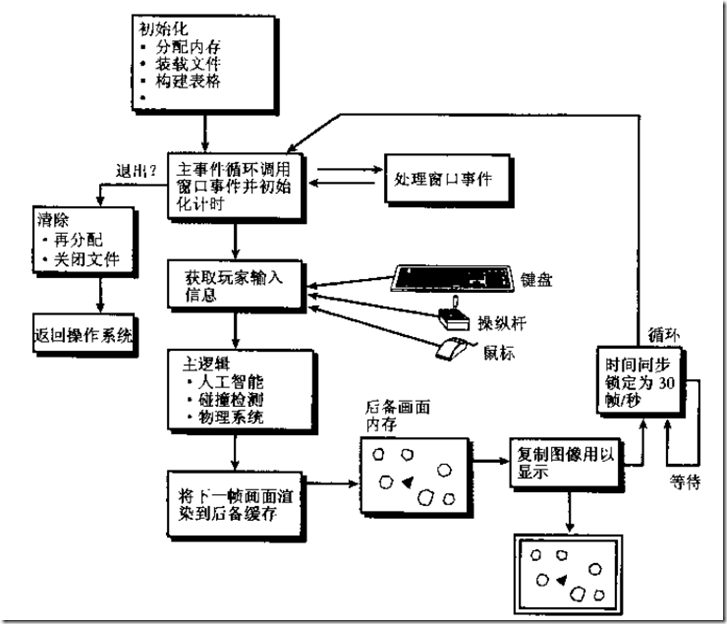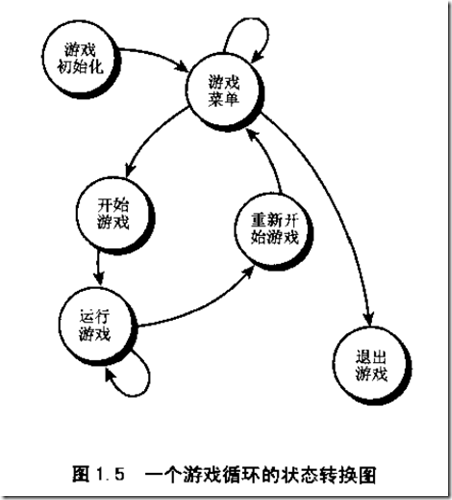1、游戏构成
一个游戏基本上是一个连续的循环,它完成逻辑动作并以一定的刷新率(书上以30帧/秒为例)在屏幕上绘制图像。
针对书上所作出了一个简化的游戏循环结构
第一步:初始化
游戏程序执行标准初始化操作,如内存分配、资源采集、从磁盘载入数据等等。
第二步:进入游戏循环
代码运行到游戏主循环体内部。
第三步:获得玩家的输入信息
游戏玩家的输入信息被处理或缓存,以备下一步人工智能和游戏逻辑使用。
第四步:执行人工智能和游戏逻辑
游戏代码的主体,诸如执行人工智能、物理系统和一般的游戏逻辑,其结果用于渲染下一帧图像。
第五步:渲染下一帧图像
游戏的输入和第四步中游戏人工智能和游戏逻辑执行的结果,被用来产生游戏的下一帧动火。这个图像通常放在不可见的缓存区内,因此玩家不会看到它逐渐被渲染的过程。随后该图像被迅速拷贝到显示存储器中并显示出来。
第六步:同步显示
通常由于游戏复杂程序不同,游戏在计算机上运行的速度会不一。因此必须把游戏按照某个最大帧速率进行同步,并使用定时功能或等待函数来维持同步。
第七步:循环
返回到游戏的入口并重新执行上述全部步骤。
第八步:关闭
表示将退出主程序或游戏循环,并回到操作系统。然而,在用户进行结束之前,用户必须释放所有的资源并清理系统。
其实在大多数情况下,游戏循环是一个含有大量状态的FSM(有限状态自动机)下面贴出书上的源码。
1: // defines for game loop states
2: #define GAME_INIT // the game is initializing
3: #define GAME_MENU // the game is in the menu mode
4: #define GAME_STARTING // the game is about to run
5: #define GAME_RUN // the game is now running
6: #define GAME_RESTART // the game is going to restart
7: #define GAME_EXIT // the game is exiting
8:
9: // game globals
10: int game_state = GAME_INIT; // start off in this state
11: int error = 0; // used to send errors back to OS
12:
13:
14: // main begins here
15:
16: void main()
17: {
18: // implementation of main game loop
19:
20: while (game_state!=GAME_EXIT)
21: {
22: // what state is game loop in
23: switch(game_state)
24: {
25: case GAME_INIT: // the game is initializing
26: {
27: // allocate all memory and resources
28: Init();
29:
30: // move to menu state
31: game_state = GAME_MENU;
32: } break;
33:
34: case GAME_MENU: // the game is in the menu mode
35: {
36: // call the main menu function and let it switch states
37: game_state = Menu();
38:
39: // note: we could force a RUN state here
40: } break;
41:
42: case GAME_STARTING: // the game is about to run
43: {
44: // this state is optional, but usually used to
45: // set things up right before the game is run
46: // you might do a little more housekeeping here
47: Setup_For_Run();
48:
49: // switch to run state
50: game_state = GAME_RUN;
51: } break;
52:
53: case GAME_RUN: // the game is now running
54: {
55: // this section contains the entire game logic loop
56: // clear the display
57: Clear();
58:
59: // get the input
60: Get_Input();
61:
62: // perform logic and ai
63: Do_Logic();
64: // display the next frame of animation
65: Render_Frame();
66:
67: // synchronize the display
68: Wait();
69:
70: // the only way that state can be changed is
71: // thru user interaction in the
72: // input section or by maybe losing the game.
73: } break;
74:
75: case GAME_RESTART: // the game is restarting
76: {
77: // this section is a cleanup state used to
78: // fix up any loose ends before
79: // running again
80: Fixup();
81: // switch states back to the menu
82: game_state = GAME_MENU;
83: } break;
84:
85: case GAME_EXIT: // the game is exiting
86: {
87: // if the game is in this state then
88: // it's time to bail, kill everything
89: // and cross your fingers
90: Release_And_Cleanup();
91:
92: // set the error word to whatever
93: error = 0;
94:
95: // note: we don't have to switch states
96: // since we are already in this state
97: // on the next loop iteration the code
98: // will fall out of the main while and
99: // exit back to the OS
100: } break;
101:
102: default: break;
103: } // end switch
104:
105: } // end while
106: // return error code to operating system
107: return(error);
108:
109: } // end main
110:
上面的代码,基本上所有游戏的循环或多或少的都是这个结构设计的。下面最后给猪游戏循环逻辑的状态转换图。





